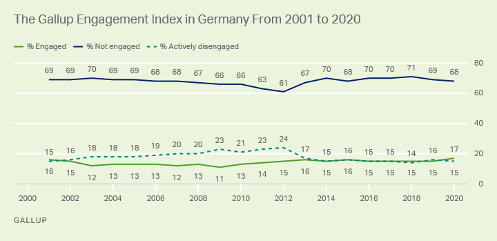Although the report shows a wide range in employee engagement levels across Europe, individual countries tended to have registered barely any change in engagement levels between 2019 and 2020. This stagnation follows an even longer trend - engagement has barely budged in the past 10 years.
Across most European countries, fewer than two in 10 employees are engaged by their day-to-day workplace experiences. Even Germany, the economic powerhouse of Europe, has seen stubbornly flat engagement since 2001.

In contrast, employee engagement has been slowly but steadily rising worldwide. In the US, engagement climbed from 26% in 2000 to 36% in 2020. Globally, it increased from 12% in 2009 to 20% in 2020.
Employee engagement matters
Employee engagement is about more than workers’ happiness or satisfaction. Our approach to measuring engagement focuses on 12 workplace elements with proven links to performance outcomes, such as knowing what is expected of oneself at work, experiencing encouragement and development, and knowing how one’s daily work contributes to the purpose of the organisation.
Our most recent meta-analysis shows that improving employee engagement increases a host of positive organisational outcomes, including retention, safety, sales, productivity and profitability. Furthermore, our studies of companies during difficult economic times have shown that engagement is an even stronger predictor of performance when times are tough.
Our German research has repeatedly demonstrated that engaged employees are more likely than their less engaged counterparts to say their workplace helps them be productive.
Unsurprisingly, we have also found that employee engagement is related to workers’ wellbeing. When people feel supported at work, they feel better about their lives overall. They’re more likely to be considered thriving in their wellbeing and are less likely to report feeling stressed or worried.
Ways to boost engagement:
Relevance: the key to organisational engagement
The line manager's role in engagement
HR needs to act to protect employee engagement
It is possible to raise low engagement
Despite a decade of stagnation, it would be wrong to think that low engagement is inevitable. Across cultures, we find that everyone has the same emotional needs at work, and the research shows that when those needs are met, people respond with greater motivation, innovation, creativity and passion.
These are not impossible things for organisations to fulfil. Gallup’s work with clients across Europe has shown that employee engagement can be improved when leaders choose to make work meaningful and make engagement a priority. These companies are able to engage 44% of their workforce, compared with only 16% across Europe.
Organisational change is possible, but it begins at the top. Leaders can show their commitment by actively listening to their employees’ needs. Surveying their employees on employee engagement and wellbeing is a good place to start. Engaging managers are drivers of positive sentiment, yet most lack an understanding of how well they engage their people and how they feel about work.
Companies need to provide managers with data so they know where they stand and can take action. A survey itself will not fix these issues, but it can provide the basis for important conversations and data-driven decision-making, rather than conjecture and guesswork.
Managers account for 70% of the variance in team engagement, they are the single greatest influence on employee engagement. For this reason, organisations need to focus on training them, yet the reality is that most managers do not receive enough training. Given that most managers do not have natural management talent, this is concerning. They must be educated and trained to be more effective at having quality conversations with employees.
European companies that focus on these areas have seen their employee engagement soar while also having a positive effect on employee wellbeing and company performance. It is time for other European companies to follow suit.
Pa Sinyan is managing partner for Europe and Marco Nink, regional lead in research and analytics, EMEA at Gallup









